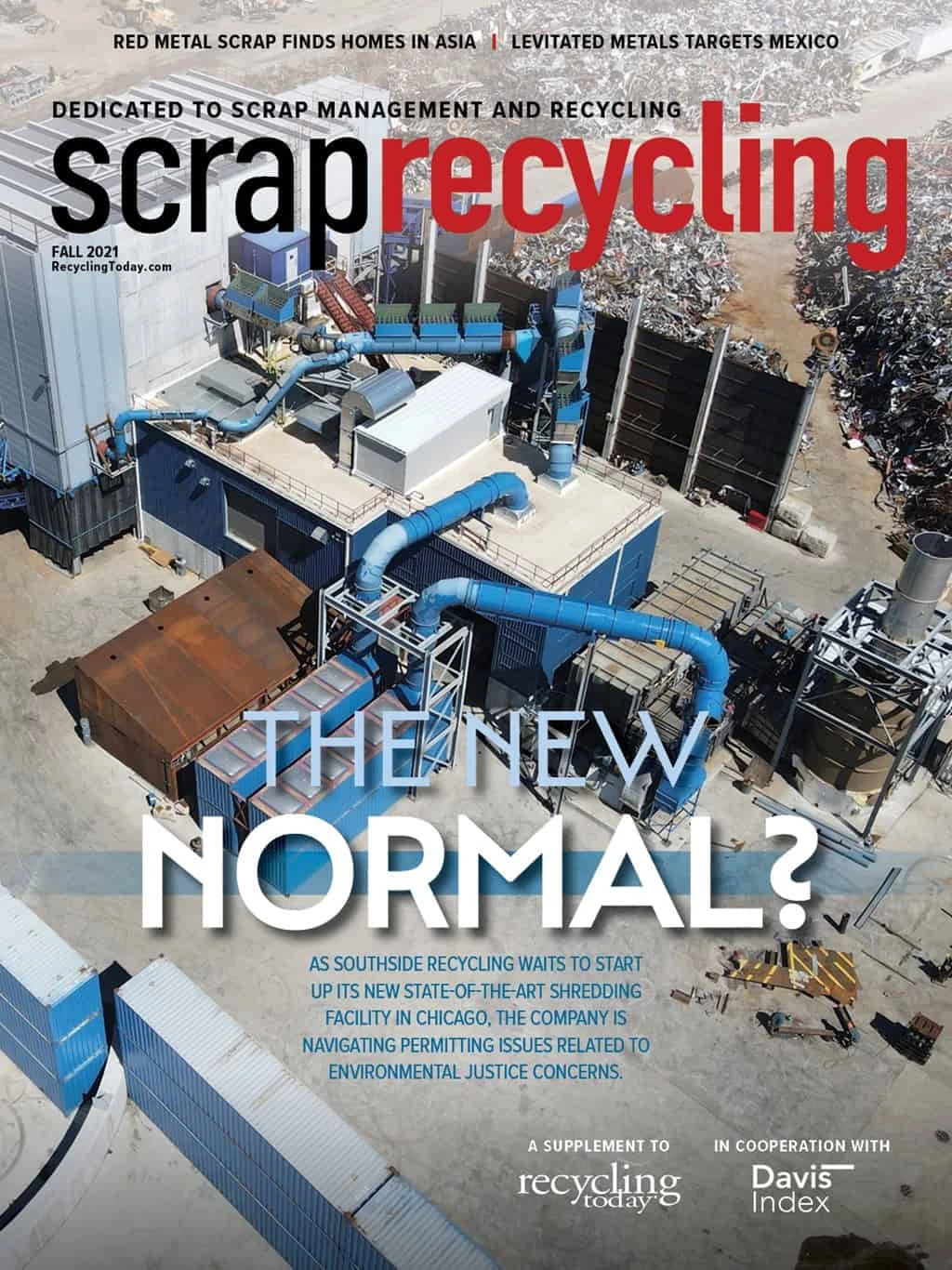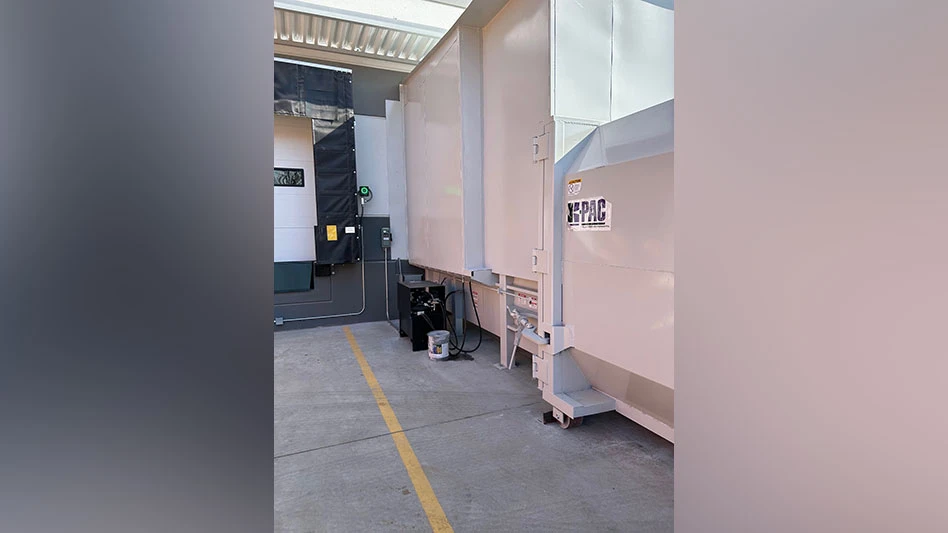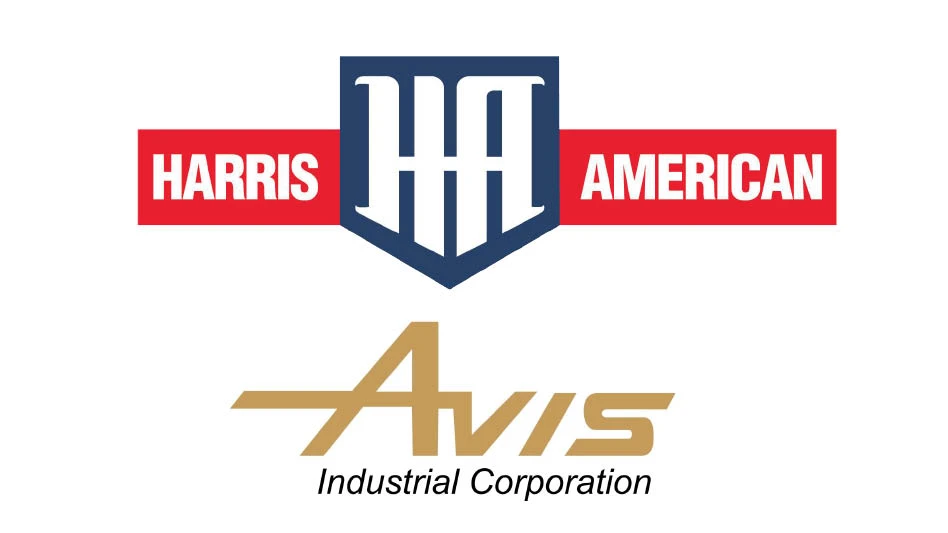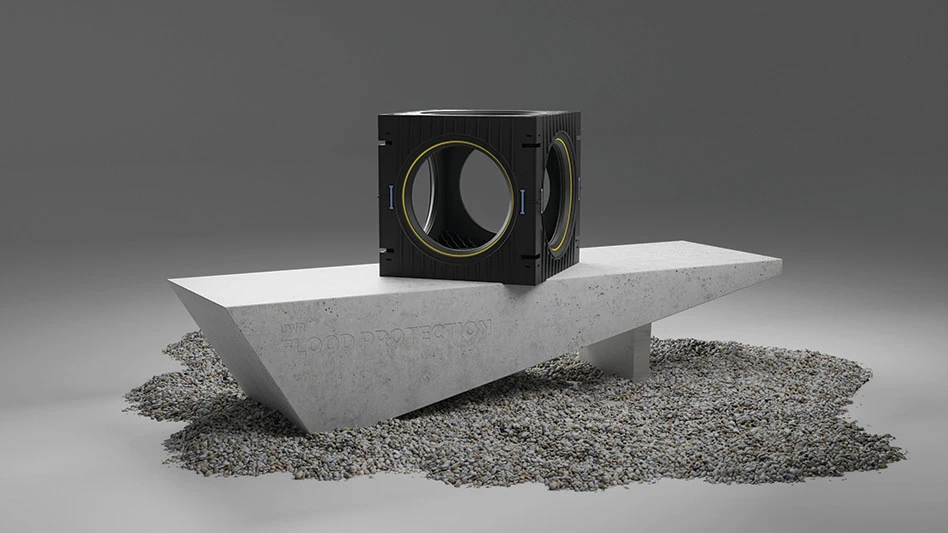
When Reserve Management Group (RMG), headquartered in Stow, Ohio, began constructing Southside Recycling a few years ago in Chicago, it intended to build the most advanced automobile shredding facility in the country. To date, RMG has invested $80 million to build the facility on a 175-acre property that it owns along the east side of the Calumet River. RMG also operates other long-running recycling businesses—including Reserve Marine Terminals, Napuck Salvage of Waupaca, South Shore Recycling and Regency Technologies—at the site, parts of which it has owned for nearly 25 years.
“We wanted to build the best shredding facility imaginable,” says Hal Tolin, RMG’s chief operating officer. “We’re very confident we’ve done that.”
RMG says it designed Southside Recycling with environmental protections and the community in mind.
The facility features a European-style shredder enclosure to better contain noise and emissions. It incorporates a regenerative thermal oxidizer (RTO) and wet scrubber to address the release of volatile organic compounds (VOCs). The shredder also features a suction hood and high-efficiency filters to capture metals and particulate matter. The Southside Recycling operation even features an on-site wastewater treatment plant and air monitors that will measure emissions 24/7 once the business is running.
RMG has performed various landscaping improvements, including planting and maintaining about 200 native trees, on the 5-acre strip that separates the facility from the neighboring community. Over the many years RMG has operated in this part of the city, the company says it has engaged with the community by backing youth sports leagues, supporting the local police department and providing material and financial assistance to the Southeast Side of Chicago Food Pantry, which distributes meals to more than 1,200 people each week out of a building on RMG’s property that the company has provided to the pantry rent-free since April 2019.
By early 2021, all the equipment had been installed and the employees were ready for business to ramp up at Southside Recycling. The company was just waiting on the large recycling facility (LRF) permit from the city of Chicago so it could begin operations. According to RMG, this new permit applies to just a few businesses that meet certain thresholds for the volume of material handled, and the rules governing it were released in June of 2020. Southside Recycling was the first company to apply for an LRF permit under these new rules.
Southside Recycling submitted its permit application in November 2020. Shortly before this submission, the company says, it had received promises from city officials that its permit would be issued by year-end. Following a public hearing on the application and a request for additional information from the Chicago Department of Public Health (CDPH), the company submitted a revised application in mid-January 2021. Tolin says that, following the submission of the revised application, the city assured the company that its application was complete and sufficient.
But, as winter turned to spring, Southside Recycling still had not received the anticipated permit it needed to begin operations. Tolin says the city sent another request for additional information about the facility and the other RMG businesses operating on its property—details that he says were not mentioned in the permit application requirements or any other part of the permitting process to that point.
Environmental justice (EJ) activists also protested the Southside Recycling facility, expressing concerns about the facility’s proximity to schools and residential neighborhoods on Chicago’s southeast side. According to the company, these concerns were heeded by CDPH in spite of its own LRF rules’ defining “sensitive areas” as those within 660 feet of a school. RMG says Southside Recycling’s shredder is more than 2,500 feet away from the nearest school.
The city shut down its permit review process for the Southside Recycling facility in the first week of May after U.S. Environmental Protection Agency (EPA) Administrator Michael Regan wrote a letter to Chicago Mayor Lori Lightfoot. This letter, which referenced previous conversations between Lightfoot’s administration and the EPA, suggested that the city halt the permit review process to perform an EJ analysis and health impact assessment on the facility. Regan’s letter did not include details of the suggested analysis to be performed or cite any relevant EPA authority over the city’s permitting process.
Steve Joseph, CEO of RMG, says that as of early September the company had yet to receive any information on this analysis. “Nobody has defined what [the assessment] is, what they’re doing and when they’re doing it,” he says. “Commissioner Regan’s letter came out on May 7, and then [CDPH Commissioner] Dr. [Allison] Arwady sent me a letter on the 10th that said something to the effect of, ‘In the coming weeks, we’ll be letting you know what we’re doing.’
“We’ve reached out many, many times to ask, ‘What can we do to help? What are you doing? When are you doing it?’ I think it has been 17 or 18 weeks since the Regan letter. I don’t want to count again. We’ve gotten nothing,” he says of the situation in early September.
As of press time, things had not changed for the company. Southside Recycling is stuck in limbo, waiting for details of the additional assessment and the issuance of the LRF permit.
A shredding partnership
The story of Southside Recycling traces back to an agreement that RMG negotiated with Chicago-based General Iron several years ago.
General Iron, which was owned by the Labkon family, had operated an automobile shredder in the Lincoln Park neighborhood on the north side of Chicago since the 1970s. While the Lincoln Park neighborhood originally was zoned as a planned manufacturing district (PMD), the neighborhood gentrified over the years, and manufacturing businesses began leaving the area.
A few years ago, the city removed the PMD designation from the Lincoln Park site. General Iron remained one of the only manufacturing businesses left, and the scrap recycler faced pressure from neighbors and the city to relocate or cease operations.
RMG had been operating recycling businesses on its southeast side property since the 1990s, and Joseph says he had been paying attention to General Iron’s situation for some time. Although RMG had stayed out of the shredding business, he says the company saw an opportunity to build a new business as General Iron continued to face pressure to shut down its longtime operation in Lincoln Park.
“We had a relationship with the Labkons. We did a little bit of business with them and knew them,” Joseph says. “We picked up the phone one day and said, ‘We know you’ve put this business on the market, and we know that you’ve been looking around for property.’”
In 2018, RMG struck a preliminary deal with the Labkon family to buy General Iron’s assets and build a new facility on RMG’s existing property. The companies envisioned the arrangement would lead to “a new, modern metal recycling facility.”
Around that same time, RMG and General Iron met with community stakeholders and environmental groups on the southeast side, including the Southeast Environmental Task Force (SETF), the Southeast Side Coalition to Ban Petcoke and the Natural Resources Defense Council (NRDC), to answer questions about the proposed recycling facility and explain how the design of the new business would ensure protection of the community and environment.
However, when the companies attempted to continue a dialogue with the environmental groups, they were firmly turned down. “SETF and the local, regional and national organizations aligned with SETF uniformly and unconditionally oppose the proposal for General Iron to operate on Chicago’s southeast side [sic],” Keith Harley, an attorney for SETF, wrote via an email that RMG shared with Recycling Today. RMG says Harley incorrectly identified its business as General Iron in the correspondence. “These organizations are determined to oppose General Iron at every point in the approval process and, if necessary, every day thereafter.”
During this period, the companies also were engaged in discussions about the project with the city of Chicago. “Before we closed the deal, we knew the city would be a key piece of this,” Joseph says. “We needed to know that we could continue to run operations on the north side [in Lincoln Park] while we constructed a facility and got the permits to do this.”
In 2019, Chicago elected Lori Lightfoot to take over as mayor. Discussions between the city and the companies paused for several months as the new mayoral administration took office. Talks eventually restarted, and, after numerous meetings, an agreement between RMG, General Iron and the city of Chicago was signed in September 2019. This contract enabled the continued operation of the Lincoln Park site until the end of 2020 and outlined how the city would “reasonably cooperate with RMG in achieving the efficient, expeditious transition of the business to the Southside Properties, including reasonable assistance with processing and review of license and permit applications.” The agreement also includes clauses providing for meetings at the request of any party no less than once every 60 days, as well as a promise from the city to apply enforcement of its ordinances, rules and regulations “neutrally and consistently to General Iron, RMG and other metal recycling facilities in the city.”
“We closed the transaction with the Labkons a week or two after signing the agreement with the city,” Joseph says. “[The acquisition] was ready for approximately 10 months, but we were not closing the deal before having that signed agreement with the city. We knew what we were going to spend [on the new facility], and we knew we needed cash flow from existing operations to be able to get us through the gap.”
Also in September 2019, RMG applied to the Illinois Environmental Protection Agency (IEPA) for a construction permit to build and operate the shredder, a process that would normally include a 90-day public comment period. Given the environmental justice concerns that had long affected the southeast side of Chicago, IEPA took additional steps to allow for public review of and comment on the permit application. In June 2020, after a 270-day public comment period that included multiple public hearings, the IEPA issued the construction permit and related conditions by which Southside Recycling would be required to abide. Those conditions were shaped by the concerns voiced by members of the public as well as by IEPA’s consultation with scientists from Region 5 of the U.S. EPA, who commended the state agency on its thorough public engagement and environmental justice process.
In the same month that the IEPA permit was issued, the city announced its new rules governing permits for large recycling facilities. The company reports that RMG and General Iron had been aware that these rules—primarily aimed at shredding operations like Southside Recycling—were in the works, but figuring out how to design and build a facility that abided by the new regulations presented another obstacle for the company to navigate. These rules include standards for monitoring pollution, noise and traffic, among other things.
“They created the new large recycling facility permit, which we knew was going to happen before we started construction,” Joseph adds. “We and others, including the environmental groups, provided input and worked with the city to develop those rules. They had public meetings talking about what that LRF permit was going to look like. It’s probably the most stringent recycling facility permit that exists anywhere in the United States, especially given the requirement for 24/7 air monitoring.”
In response to the LRF rules, RMG ensured that Southside Recycling included air monitors at the perimeter of the property, which Joseph says are operational today. When the business is running, emissions data will be available to the city and to community stakeholders.
To date, Joseph says he has only seen one other automobile shredder in his 30-plus-year career that comes close to the level of environmental management that Southside Recycling has installed to comply with the LRF rules.
Southside Recycling submitted its initial application for the LRF permit in November 2020. After filing an amended application in response to Chicago’s request for additional details and clarifications, Joseph says the company began receiving assurances from the city in January of this year that the revised application satisfied all LRF permit requirements.
General Iron was set to close operations in Lincoln Park at the end of 2020 per the agreement with the city. Joseph says RMG spoke with city officials numerous times in the last few months of that year to discuss timing of General Iron’s shutdown and receipt of Southside Recycling’s permit.
“We pointed out to the city that we had been promised our permit by the end of 2020,” Joseph says. “Since we hadn’t received it, we also told them that we were considering the option of remaining operational on the north side.
He continues, “We were told in no uncertain terms [on Dec. 31, 2020], ‘If you don’t shut down tomorrow, forget about doing anything on the south side. But don’t worry, you’ll get your permit.’”
At that point, Joseph says, RMG saw few alternatives. “We said, ‘OK. We’re going to comply with the agreement, and they’re going to do what they said they’re going to do. We have to shut down, so we’ll shut it down.’ At the end of the day on the 31st, we finished working and subsequently started dismantling.”
But months passed after General Iron closed, and Southside Recycling was left waiting on the LRF permit. Tolin says the company was in regular communication with CDPH that eventually culminated in an April 26 letter to Commissioner Arwady outlining everything that had happened to that point and requesting a meeting with her per a condition in the companies’ signed agreement with the city.
The company never got that meeting with Arwady, and, in May, the city announced an indefinite halt to its review of Southside Recycling’s permit application in response to Regan’s letter.
Joseph says, “The mayor shut this down due to pressure and to score political points—she clearly has that with the people that are screaming about this. And we’re caught in the crosshairs.”
Taking legal action
Given the lack of a permit in spite of the city’s signed contract promising fair and timely review, the closure of General Iron’s north side operation as outlined in that same contract and the assurances from Chicago officials that Southside Recycling’s LRF permit application was complete and sufficient, RMG and Southside Recycling decided to take legal action.
In mid-May, Southside Recycling and RMG filed a federal lawsuit seeking a court order that would direct Chicago to issue the final permit to the company. The lawsuit alleged that the city had wrongfully failed to issue the last permit needed for Southside Recycling to begin operations, despite acknowledging for months that the company had satisfied all the requirements.
However, U.S. District Judge Robert M. Dow rejected RMG and Southside Recycling’s claim that its constitutional rights were violated since the city had not yet denied the permit application, rendering the company’s claims not ready for adjudication in federal court. Dow dismissed the lawsuit June 30, noting that Southside Recycling’s claims were better suited for state court at that time.
In response, the company filed a lawsuit in the Illinois Circuit Court of Cook County in early July. This lawsuit alleges that the city wrongfully failed to issue the last permit needed for the company to begin operations in spite of its acknowledgments that Southside Recycling had satisfied all requirements.
In the second week of September, Circuit Judge Michael Mullen scheduled a preliminary trial for Oct. 20 at which Southside Recycling will have an opportunity to prove its claims in court.
Recycling Today reached out to Mayor Lightfoot’s office to learn the city’s perspective on the recycler’s permitting process and operations, but the city declined to be interviewed and instead provided a statement via email from the CDPH.
“We appreciate Recycling Today’s desire to present a fair and balanced report related to the issues involved with permitting for Southside Recycling/RMG’s recycling operation on Chicago’s southeast side, but at this time we are not able to discuss this matter, as it is once again being litigated,” the Aug. 3 statement from the CDPH to Recycling Today reads. “The Chicago Department of Public Health has engaged in a thoughtful, data-driven and robust process that took into consideration the application, supplemental materials, expert reports and studies, as well as input from residents who will be most directly impacted by RMG’s proposed new use. Given the recent directive from the U.S. Environmental Protection Agency, we must work with them to conduct a further analysis of potential adverse environmental impacts.”
Evaluating concerns
Although Southside Recycling installed what it says to be the latest technologies available to reduce emissions and control pollution, including the RTO and wet scrubber to address VOC emissions from the shredder, EJ activists expressed concerns about the facility throughout the permitting process. A few activists also participated in a hunger strike for weeks earlier this year to gain the attention of Chicago officials.
A main concern activists have expressed is that the facility is too close to schools and residential neighborhoods to safely operate.
“General Iron was pushed out of the north side because the community had very real concerns over fires, explosions and emissions at the facility,” says Gina Ramirez, Midwest outreach manager for the Natural Resources Defense Council’s Chicago office, which opposes the facility and its plans for startup. “Southeast side residents have consistently raised concerns about General Iron moving a massive metal shredding operation next to our schools, homes and parks.”
She adds that she also is concerned about an abandoned building that collapsed on RMG’s 175-acre campus earlier this spring, which the company confirmed this summer. “RMG’s latest safety lapse and failure to abide by city regulations brings home why another dangerous facility does not belong at the RMG site and why southeast side residents cannot trust RMG’s hollow promises to be a good neighbor.” The company pointed out that the collapsed building, which is located at the other end of the RMG property more than a quarter mile from the new shredder, had been unused and unoccupied for over 30 years.
Activists also cite that the shredding facility moved from a wealthier, majority-white neighborhood on the north side to a majority Black and Latino neighborhood on the southeast side, which they say is an EJ violation. In an online press conference Aug. 4 hosted by Southeast Environmental Task Force, Lauren Bianchi, a teacher at Chicago’s George Washington High School, called the move “an act of environmental racism.”
She said, “We should be working to clean up the existing toxic area, such as the building that collapsed in April, not adding to them with more air pollution.”
However, Southside Recycling says the claims of environmental racism already have been adjudicated. In October 2020, three southeast side residents brought a federal lawsuit against the city, alleging that its actions in signing the agreement with RMG and General Iron and issuing the first of several needed permits to Southside Recycling were discriminatory in nature. Judge Mary Rowland of the U.S. District Court for the Northern District of Illinois ruled in April that the residents failed to prove that the city’s actions were motivated by discrimination based on the racial makeup of the southeast side.
Joseph says RMG “vehemently denies” that the location of the facility is at all tied to the demographics of the neighborhood.
He adds, “The site was chosen because we already owned the land. RMG has operated various recycling businesses on the same land for nearly 30 years without incident or complaint from neighbors. This site also has ideal infrastructure for a shredding operation—river access to load barges and ships, railroad service for ease of shipping, high voltage electrical lines—as well as significant buffering from the surrounding neighborhood.”
He adds that pressure from the city, which was seeking to clear the way for a $6 billion multiuse development called Lincoln Yards on the north side of Chicago, ultimately led to General Iron’s closure. The company did not want to close that location, which Joseph says was profitable and properly permitted, but its hand was forced in the situation.
Sponsored Content
Redefining Wire Processing Standards
In nonferrous wire and cable processing, SWEED balances proven performance with ongoing innovation. From standard systems to tailored solutions, we focus on efficient recovery and practical design. By continually refining our equipment and introducing new technology, we quietly shape the industry—one advancement at a time.
In addition, the U.S. EPA issued a press release May 27 discussing the need to advance environmental justice in Chicago and expressing concerns that Southside Recycling could adversely affect an area of Chicago that is “historically overburdened with pollution.”
Joseph recognizes that EJ is an important issue and that the southeast side historically has been home to many polluting industries. “I don’t disagree with any of that,” he says. “But the fact that we have to defend recycling to them is insane to me. You’re environmentalists—look what we’re doing. You all drive a car, use a washing machine, have a refrigerator, drive on roads that have rebar in them. These metal products are out there; we’re all using them every day. What do you want to do with it when it’s done? I get that you don’t want it done here, but what is your alternate solution? How about a consideration of the economics and the carbon footprint of where you’re going to take it to recycle it? I get nobody wants to see it in their front yard or backyard, sure, but our shredder is significantly removed and extremely well-buffered [from the public right of way] …The distance from the shredder infeed to the nearest house is half a mile.”
He says the company’s shredder also is more than 10 times farther from public roadways and nearby residences than other shredders in Chicago, including General Iron’s shuttered Lincoln Park operation.
RMG has tried to reach out to EJ activists concerned about the site and has encouraged them to tour the facility, but Joseph says they have not engaged directly with the company since a 2018 community meeting.
Joseph adds that RMG has been working to get as many stakeholders as possible to visit the facility and see what it has constructed. “We’ve had multiple different efforts that have been going on the past year and a half trying to get as many people as we can onto the site to show them,” he says. “Every person who has actually toured the facility has been clearly impressed with what we’ve built.”
He notes that RMG polled community members in May on their opinions about the facility after a request from the city. He says the majority of community members around the facility were unaware of the project but expressed positive views when informed of the importance of metals recycling. He says, “A lot of people didn’t know anything about it. We believe, and believe the data shows, that [the opposition] is a relatively small group.”

First but not the last
It’s been nearly a year since Southside Recycling applied for its final LRF permit needed to begin operations, and, with no details on the U.S. EPA’s requested analysis and the ongoing litigation, it is unclear when the situation will be resolved.
In the meantime, the facility is ready to go and employees are in place for startup once that day comes. Joseph says the company is keeping all the shredding facility’s employees on payroll. A few employees have retired or left to pursue other opportunities, but Joseph says that Southside Recycling’s team is prepared to begin operations as soon as their permit is issued.
“We have kept all of our admin staff and everybody else who has been willing to stay. We’ve relocated some to work in other [RMG] operations, and some are working in the retail yard, but we still have about 80 people [on the Southside Recycling payroll],” Joseph says. “In this labor market, first and foremost, we don’t want to lose the crew because they are so good and were a big factor in us buying this business rather than just starting from scratch. The institutional knowledge possessed by that group of people that General Iron had is invaluable when trying to run a successful shredding operation. We don’t want to lose them, especially given the current labor market, and we’re doing whatever we can to keep everybody.”
He says he doesn’t think Southside Recycling will be the last scrap yard to face battles over air emissions and EJ.
In July, the EPA issued an “Enforcement Alert,” targeting auto shredding facilities for air quality concerns. The EPA says it had “identified Clean Air Act violations at metal recycling facilities that operate auto and metal shredders, causing excess emissions of air pollution.” According to RMG, the suggestions in the enforcement align with how Southside Recycling was designed and constructed.
During the Institute of Scrap Recycling Industries (ISRI) online convention and exposition April 20-22 and April 27-29, EPA Office of Environmental Justice Director Matthew Tejada said EJ is going to become increasingly important for scrap yard operators in the coming years. He noted that President Joe Biden released two executive orders in January alone related to EJ, adding that these orders coming from states and local governments will require scrap recyclers to consider things such as where to locate and whether to expand a business so that it does not adversely affect disadvantaged communities.
The Enforcement Alert outlines best practices for mitigation of environmental concerns at shredding operations.
Addressing emissions and considering EJ are two factors that could become the “new normal” for auto shredding operations. In Chicago, any automobile shredder operators will need to comply with the city’s LRF permit just as Southside Recycling does.
Joseph concludes, “There are multiple requests for information that are out to lots and lots of shredders in terms of VOC emissions. So, the world is changing, and it’s changing rapidly. Based on the knowledge that we have gained regarding shredder emissions, I believe that most high volume shredders will need to begin capturing and destroying emissions—as we will do at Southside Recycling—in the very near future.”
Get curated news on YOUR industry.
Enter your email to receive our newsletters.

Explore the Fall 2021 Scrap Recycling Issue
Check out more from this issue and find your next story to read.
Latest from Recycling Today
- Enfinite forms Hazardous & Specialty Waste Management Council
- Combined DRS, EPR legislation introduced in Rhode Island
- Eureka Recycling starts up newly upgraded MRF
- Reconomy Close the Gap campaign highlights need for circularity
- Nickel carbonate added to Aqua Metals’ portfolio
- EuRIC, FEAD say End-Of-Life Vehicle Regulation presents opportunity for recyclers
- Recyclers likely to feel effects of US-China trade war
- BCMRC 2025 session preview: Navigating battery recycling legislation and regulations








